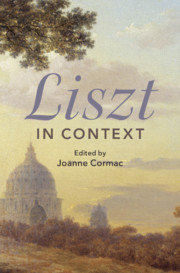Book contents
- Liszt in Context
- Composers in Context
- Liszt in Context
- Copyright page
- Contents
- Illustrations and Tables
- Contributors
- Preface
- Part I People and Places
- Part II Society, Thought and Culture
- Chapter 10 The ‘War’ of the Romantics
- Chapter 11 Visual Art and Artists
- Chapter 12 Literature and Literary Heroes
- Chapter 13 Liszt, Women and Salon Culture
- Chapter 14 Liszt as a Writer
- Chapter 15 Patronage
- Chapter 16 Liszt and the Networks of Revolution
- Chapter 17 Liszt’s National Identity
- Chapter 18 Liszt and Religion
- Part III Performance and Composition
- Part IV Reception and Legacy
- Further Reading
- Index
Chapter 12 - Literature and Literary Heroes
from Part II - Society, Thought and Culture
Published online by Cambridge University Press: 23 September 2021
- Liszt in Context
- Composers in Context
- Liszt in Context
- Copyright page
- Contents
- Illustrations and Tables
- Contributors
- Preface
- Part I People and Places
- Part II Society, Thought and Culture
- Chapter 10 The ‘War’ of the Romantics
- Chapter 11 Visual Art and Artists
- Chapter 12 Literature and Literary Heroes
- Chapter 13 Liszt, Women and Salon Culture
- Chapter 14 Liszt as a Writer
- Chapter 15 Patronage
- Chapter 16 Liszt and the Networks of Revolution
- Chapter 17 Liszt’s National Identity
- Chapter 18 Liszt and Religion
- Part III Performance and Composition
- Part IV Reception and Legacy
- Further Reading
- Index
Summary
The Countess Marie d’Agoult, an extraordinary woman of letters who wrote under the pen name Daniel Stern, recalled an early encounter with Franz Liszt:
[He] was drawn to the innovations in letters and arts which threatened the older order: Childe Harold, Manfred, Werther, Obermann, all the magnificent or desperate revolutionists of romantic poetry were the companions of his sleepless nights. With them he rose to a proud disdain for the conventions, he shuddered as they did under the hated yoke of the aristocracy, which had neither genius nor virtue as its foundation; he desired no more subjection, no more resignation, but a holy hatred, implacable and avenging, toward all iniquities.1
- Type
- Chapter
- Information
- Liszt in Context , pp. 105 - 113Publisher: Cambridge University PressPrint publication year: 2021



